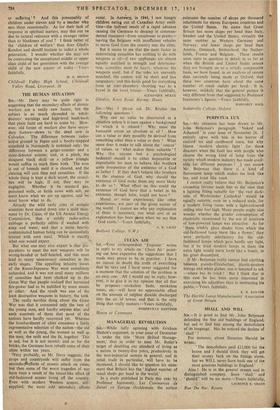THE HUMAN SITUATION
S1R,—Mr. Davy may be quite right in suggesting that the secondary effects of atomic warfare are a really new factor, but the subject is so much shrouded in witch- doctors' warnings and high-level hush-hush that plain facts are hard to come by. How- ever, old forms of warfare also have secon- dary factors—down to the dead cow in Calvados. The difference between radio- active ground in Japan and a booby-trapped minefield in Normandy is technical only; the difference between a geiger-counter and a Mine-detector minute; and, at a pinch, the eloquent black skull on a yellow triangle would suffice to mark them both. The area is out of bounds until it is cleared, and the clearing will cost time and casualties. If the whole thing is kept a dark secret, the casual- ties will be high; if not, they may be negligible. Whether it be mustard gas, poisoned wells, or fields sown with salt, we must know what we are up against, and we must know what to do.
. Already the wild early cries of ecstatic scientists have muted down into a mild state- ment by Dr. Claus, of the US Atomic Energy Commission, that a mildly radio-active cabbage is perfectly edible if washed with soap and water, and that a more heavily contaminated human being can be successfully treated with corn meal. Which is exactly what one would expect.
But what one may also expect is that pre- parations to meet the new weapons will he wrong-headed or half-hearted, and this must lead to many unnecessary casualties in the early stages. The appalling infantry losses of the Russo-Japanese War went completely unheeded, and it was not until many millions of casualties had been chalked up in the Great War that people realised that increased fire-power had to be nullified by some means or other. And the result was one of the least destructive weapons in history, the tank.
The really -terrible thing about the Great War was that it consumed only the best of the young men, and hardly anyone else; and such numbers of them that most of the nations have hardly recovered yet. Whereas the bombardment of cities consumes a fairly representative selection of the nation—the old as well as the young, the women as well as the men, the unfit and the fit, together. This is sad, but it is not mortal; and as for the bricks, the Germans have rebuilt some of their cities within ten years.
tVery probably, as Mr. Davy suggests, the crops and countryside will suffer from the secondarsilleffects of atomic attack on cities; but then some of the worst tragedies of war have been a result of the locust-like effect of old-fashioned armies living off the country. Even with modern Western armies, self- supplied, the most odd secondary effects
occur. In Antvierp, in 1944, I saw hungry children eating out of Canadian Army swill- bins—the indirect result of a rapid advance causing the Germans to decamp in comman- deered transport—from omnibuses to prams— leaving the Belgians with insufficient vehicles to move food from the country into the cities.
But it seems to me that the main factor in determining casualties has nothing to do with weapons at all—if two oppianeuts are almost equally matched in strength and determina- tion, casualties must be heavy, whatever the weapons used; but if the 'sides are unevenly matched, the contest will be short and less sanguinary; and this holds good for everything from an inter-planetary shooting war to a brawl in the local, boozer.—Yours faithfully,
ALEXANDER MCKEE
Glenlyn, Knox Road, Havant, Hants


































 Previous page
Previous page